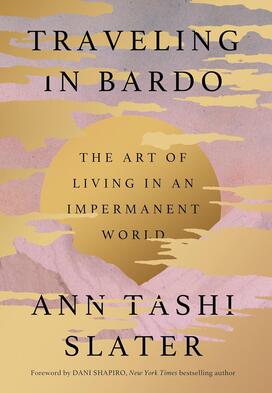Ann Tashi Slater ’84 Teaches Us How to Live in an Impermanent World
The book: Turning to ancient Tibetan wisdom, Traveling in Bardo (Balance Publishing) explores the impermanence of life. Through this meditation on loss, Slater hopes to inform the ways people choose to live. Slater teaches readers about the tradition of bardo, which refers to a period of transition in Tibetan Buddhist practice. By sharing her own experiences, she encourages society to find happiness in life and embrace moments of change.

The author: Ann Tashi Slater ’84 earned her undergraduate degree from Princeton in comparative literature. She is a writer whose work has appeared in The New Yorker, The New York Times, The Washington Post, and The Paris Review, among others. Her writing focuses on her Tibetan family history. Slater holds workshops at Princeton, Columbia, and Oxford.
Excerpt:
Prologue
Stars glitter over 28,000-foot Mount Kanchenjunga and a coal fire burns in the grate as my grandmother and I chat in her cozy living room decorated with Tibetan carpets, thangka scroll paintings of the Buddha’s life, and old family photographs. The odor of incense wafts from the prayer room down the hall, and outside, my grandmother’s Lhasa Apsos bark at people real and imagined passing in the lane. The train whistles — one long, two short — as it pulls into Darjeeling Station down near the marketplace.
I’ve just graduated from college and flown around the world from San Francisco to keep my recently widowed grandmother company. Not waiting to waste a minute of our time together, she invited family friends for meals, takes me for joyrides in her olive-green Ambassador, and regales me with stories of Tibet, turn-of-the-century Darjeeling, my mother’s girlhood, and our ancestors.
Over the years, I’ll return often to continue our conversations. Many of my grandmother’s stories are about her father, and one in particular will plant the seed for this book: Just after World War I, my great-grandfather helped bring The Tibetan Book of the Dead to the West, the first English translation of the eighth-century Bardo Thödol. In Tibetan Buddhism, bardo refers to a between-state, or period of transition. The Bardo Thödol was written to help the dead navigate the bardo between death and rebirth, and to guide us, the living, on our journey through the bardo between birth and death.
During over 40 years of writing and speaking about my family history and Buddhism, I’ve come to see how Tibetan bardo wisdom on the fleeting nature of existence can transform the way we live. By showing us how to become more accepting of the uncertainty, transitions, and endings we all must face sooner or later, the bardo teachings free us to live more fully, embracing life in all its sorrow and joy.
I dreamed once that I was being blessed by a Tibetan lama. He said, “You can tell the story coming down through the generations.” I took this to mean my personal story and the story of my family, but as I’ve learned about The Tibetan Book of the Dead and bardo, I’ve come to see that it’s also our collective story: what it means to live well, for us as individuals and as part of a family, a community, and a global society.
Traveling in Bardo: The Art of Living in an Impermanent World is not intended as an exhaustive account of explanation of The Tibetan Book of the Dead, but rather as a consideration of how the bardo teachings can help us live happier lives. I’ll draw on my girlhood in America and many years in Tokyo, as well as time spent in Darjeeling and my decades of research on Buddhism, to explore how the words of this ancient manual can benefit us today. My book begins with my grandmother’s traditional funeral, one of the last that will ever be held, followed by a look at the origins of The Tibetan Book of the Dead, my family connection to it, and the enduring fascination with bardo. Together, we’ll then explore bardo principles like acceptance, interdependence, and impermanence in relation to friendship and marriage, children and parents, and work and creativity.
Life brings change, whether it’s a new stage, such as becoming a parent or moving to another city, or the loss of someone we love, growing old, or our own death. This book is about how we can find deeper meaning and fresh direction in a world where transitions are not only inevitable but can come at any moment. As my grandmother liked to say, “Happiness is there for everyone, if only we will realize it.” I hope my book will open new perspectives for you on how to find lasting happiness in our impermanent world.
Chapter 1 - My Grandmother’s Funeral
A Window into Life
On a winter afternoon in 2004, I landed at a tiny airport north of Calcutta and began the sad journey into the Himalayas for my grandmother’s funeral. The taxi driver sped up the winding road that I’d first traveled over 40 years earlier on my mother’s lap, when I was a small girl and visiting Darjeeling with my parents. Now I gazed out at the familiar tea gardens and villages, the dense forests of bamboo and palms and wild orchids. Soon the car was enveloped in swirling mist, all coming and going as in dreamtime: a wizened man standing outside a cottage holding a sickle, monkeys scampering by the roadside, prayer flags fluttering over a gorge, four lamas walking single file on a dirt path, their robes vermilion in the gloom.
I reached Darjeeling at twilight, as the snowy peaks of Mount Kanchenjunga were vanishing into the blue like great ships setting sail. Along the road, shoppers thronged the market stalls, buying live chickens, vegetables, spices, snacks, and sundries. A barefoot boy hawked bracelets, crying out in a high, singsong voice. As we passed the railway station and made the hairpin turn into my grandmother’s lane, I felt afraid, because for the first time, my grandmother wouldn’t be waiting for me at the door to her little house. When I’d come to see her over the years, I’d always arrived late in the day, and she was ready with cucumber sandwiches and freshly brewed Darjeeling tea. But now, instead, there would be tea for the people streaming in to pay their respects.
I started up the polished wooden stairs to the second floor, the same stairs my mother used to take two at a time after school, hungry for the momo dumplings and fried flour jalebis my grandmother would put out in the dining room; the stairs that my mother carried me up when I was a little girl; that I climbed when I lived with my grandmother after college and that my own children bounded up when we came for visits. The same stairs my grandmother’s body would be brought down in a few days, when the death ceremonies were finished and she left her house for the very last time.
My mother had already arrived from her home in California and was on the landing greeting condolence callers.
“She was the grand old lady of Darjeeling,” people were saying. “A legend.”
“No one will replace her.”
“It’s the end of an era.”
I walked with my mother along the hall to the altar room, where the prayers for my grandmother were underway. In the glow of butter lamps burning on the old altar carved with the Tibetan lucky symbols, five red-robed lamas sat next to my grandmother’s body, which lay on cushions under a mound of white khada blessing scarves. In low, incantatory voices, the lamas were reading from The Tibetan Book of the Dead, encouraging my grandmother to move forward in the bardo between death and rebirth: “Be not attached to this world,” they said. “Be not weak.”
“Would you like to see your grandmother?” my mother asked in a matter-of-fact voice.
Excerpted from Traveling in Bardo by Ann Tashi Slater. Copyright © 2025 by Ann Tashi Slater. Reprinted with permission of Balance Publishing, an imprint of Hachette Book Group. All rights reserved.
Reviews:
“A rich and freewheeling meditation on life, death, and impermanence.” — Publishers Weekly
“Powerfully merging the personal and the universal, Traveling in Bardo brings to life stories of Ann Tashi Slater’s past, her Tibetan ancestors, and The Tibetan Book of the Dead, demonstrating what it means to live fully amidst the impermanence and unpredictability of existence.” — Sharon Salzberg, bestselling author of Lovingkindness












No responses yet